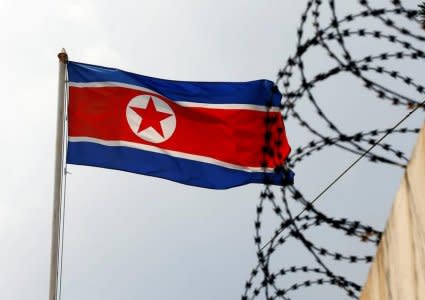Tackling North Korea's chronically poor sewage 'not rocket science': U.N.

Thomson Reuters
By Tom Miles
GENEVA (Reuters) - North Korea has a problem with human waste which is threatening the health of its children, according to a rare survey of family life in the reclusive country by a U.N. agency that also praised Pyongyang's "improved openness" with data.
The data, published on Wednesday by the U.N. children's agency UNICEF, was collected by Pyongyang's Central Bureau of Statistics last year, based on an international methodology, and lays bare some of the hardships in the lives of the population.
"This new seriousness and improved openness about data is, in UNICEF’s view, a real step forward," UNICEF's East Asia director Karin Hulshof told a news conference.
One piece of good news from the survey of 8,500 households was that most people had access to a toilet or latrine. The bad news was that 93 percent of sanitation facilities were not connected to a sewage system.
Instead, human excrement was used as fertilizer on fields, creating a risk of spreading intestinal worms which deprived people of valuable nutrients.
"The government is looking at this and they have started looking at how to manage human excreta in a different manner. One can also start producing other sorts of fertilisers. It's not rocket science to make fertilizer," Hulshof said.
Such findings showed the value of the survey, the first since 2009, she said.
A quarter of households had contaminated drinking water and nearly one in five North Korean children were stunted - a symptom of chronic malnutrition linked to poor educational outcomes and low productivity in adulthood.
But that was lower than a 32 percent stunting rate recorded in 2009, Hulshof said.
SANCTIONS
The United Nations is restricted in the aid it can give to North Korea because of international sanctions, but it can help with nutrition, health, water and sanitation - as long as it has the basic data on the needs of the people, she said.
The survey also included a graph of North Korea's misshapen demographic distribution, showing the massive impact of the 1990s famine, especially on boy babies.
Last year, women aged 20-24 made up about 4 percent of the population, while men of the same age accounted for only about 2.5 percent - about 1 in 40 North Koreans.
Most children in North Korea were subjected to some kind of violent discipline, and 7 percent of children aged between 5 and 11 were engaged in child labor, the data showed.
While 98 percent of households had a television and 69 percent had a mobile phone, only 19 percent had a computer.
Only 1 percent nationally, and 5 percent in the capital Pyongyang, had access to North Korea's intranet, but there was no internet, Hulshof said.
Earlier this month, North Korean leader Kim Jong Un held a historic meeting in Singapore with U.S. President Donald Trump and they reaffirmed a commitment to work toward complete denuclearization of the Korean peninsula, though Washington and South Korea say sanctions on the North will remain for now.
(Reporting by Tom Miles; Editing by Gareth Jones)
See Also:

 Yahoo News
Yahoo News 
